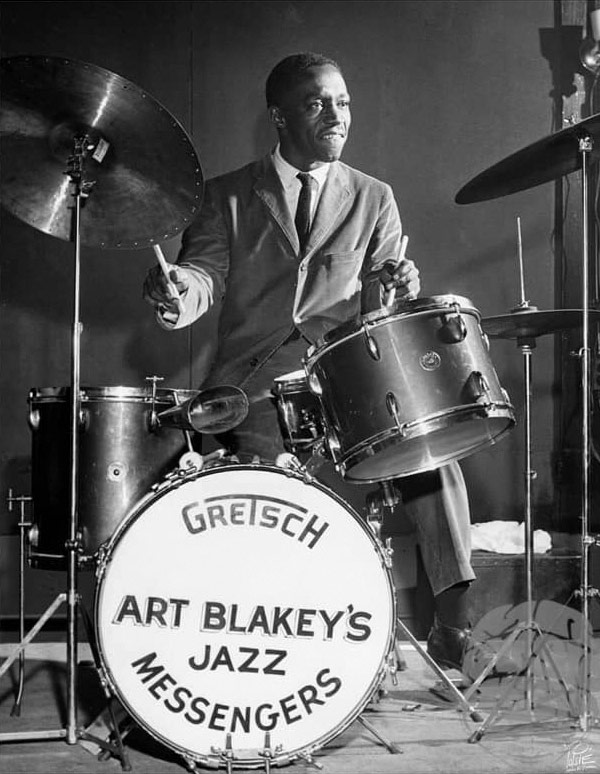Art Blakey, born Arthur Blakey on October 11, 1919, in Pittsburgh, Pennsylvania, was a highly influential American jazz drummer and bandleader. He is best known as one of the key figures in the development of modern jazz, particularly through his role in the evolution of the hard bop style. Blakey’s impact on jazz extends far beyond his technical prowess on the drums; he was also a mentor to several generations of jazz musicians and a tireless advocate for the art form.
Musical Style and Contributions
Art Blakey’s drumming was characterized by its power, precision, and relentless swing. He was known for his distinctive press roll and his ability to drive a band with explosive rhythms. Blakey was a master of the shuffle rhythm and polyrhythms, which became a hallmark of his performances. His approach to drumming emphasized the use of drums as a melodic instrument, adding a dynamic layer to jazz compositions.
In 1954, Blakey co-founded the Jazz Messengers with pianist Horace Silver. The group became a quintessential ensemble in the hard bop movement, which combined the sophistication of bebop with elements of blues, gospel, and R&B. After Silver left, Blakey took full leadership of the Jazz Messengers, a role he maintained until his death in 1990.
The Jazz Messengers and Legacy
The Jazz Messengers served as a training ground for many of the most important jazz musicians of the late 20th century. Blakey had a keen eye for talent and nurtured the careers of numerous young musicians who went on to become legends in their own right. Some of the notable alumni of the Jazz Messengers include trumpet players like Lee Morgan, Freddie Hubbard, and Wynton Marsalis; saxophonists such as Wayne Shorter, Benny Golson, and Branford Marsalis; and pianists like McCoy Tyner, Chick Corea, and Keith Jarrett.
Blakey’s commitment to mentoring young talent was unparalleled. He was known for encouraging his band members to compose and arrange, thereby giving them opportunities to develop their own voices as artists. His bands were always at the forefront of innovation in jazz, continually refreshing the hard bop genre with new ideas and sounds.
The Best Of Art Blakey – Playlist:
Influence on Jazz and Beyond
Art Blakey’s influence on jazz is immeasurable. Through his work with the Jazz Messengers, he helped to define the sound of hard bop, a style that remains a cornerstone of jazz. His emphasis on the groove, soulful expressiveness, and musical communication set a standard for jazz performance that has influenced generations of musicians.
Blakey’s work has also had a significant impact on jazz education. Many of his former band members became educators themselves, passing on the principles of jazz that they learned under Blakey’s leadership. His approach to music, which combined discipline with creative freedom, has become a model for jazz pedagogy around the world.
Art Blakey’s recordings with the Jazz Messengers, such as “Moanin’,” “A Night in Tunisia,” and “Free for All,” remain some of the most celebrated works in the jazz canon. His legacy is also preserved through numerous live recordings that capture the energy and spontaneity of his performances.
The Official YouTube Channel of Art Blakey!
https://www.youtube.com/channel/UC4FHYRArHwrMWrzNJuYNzmA
Honors and Awards
Throughout his career, Art Blakey received numerous accolades for his contributions to jazz. He was inducted into the DownBeat Jazz Hall of Fame in 1981 and was awarded a Grammy Lifetime Achievement Award posthumously in 2005. His work continues to inspire both jazz musicians and listeners, cementing his status as one of the true legends of the genre.
References
- “Art Blakey Biography” – Jazz Music Archives. Available at: jazzmusicarchives.com
- Rosenthal, David H. Hard Bop: Jazz and Black Music 1955-1965. Oxford University Press, 1993.
- Cook, Richard, and Morton, Brian. The Penguin Guide to Jazz Recordings. Penguin Books, 2008.
- Yanow, Scott. Jazz: A Regional Exploration. Greenwood Publishing Group, 2005.


Leave a Reply